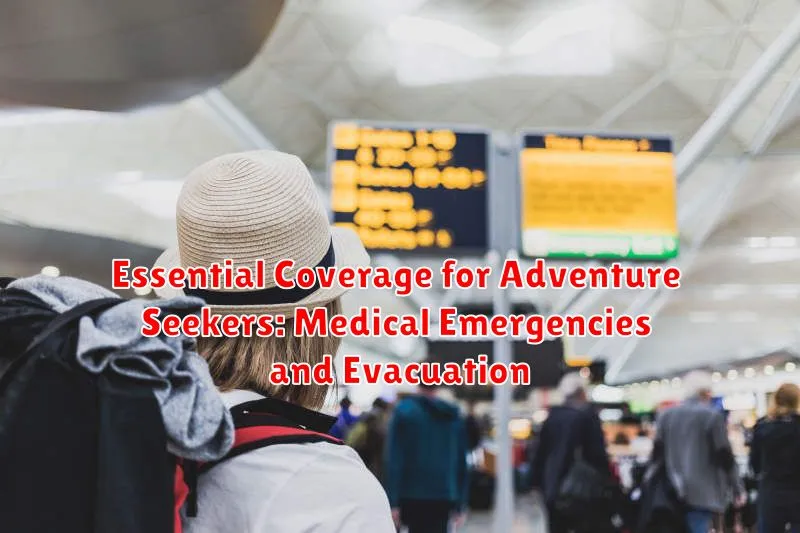Are you an adventurous soul with wanderlust in your heart? Planning your next backpacking trip is exciting, but it’s crucial to remember that unexpected situations can arise. Travel insurance is your safety net, providing peace of mind and financial protection during your journey. This ultimate guide will delve into the world of travel insurance for backpackers, exploring the essential coverage, crucial considerations, and tips for finding the perfect policy for your adventure.
Backpacking often involves exploring remote destinations, engaging in adventurous activities, and venturing off the beaten path. While this thrill is part of the appeal, it also exposes you to higher risks. From medical emergencies and flight delays to lost luggage and theft, travel insurance acts as your shield, minimizing financial burdens and allowing you to focus on your travels.
Why Backpackers Need Travel Insurance
Backpacking is an amazing way to experience the world, but it also comes with its own set of risks. From unexpected illnesses and injuries to lost luggage and flight cancellations, things can go wrong when you’re on the road. That’s why travel insurance is essential for any backpacker. Travel insurance provides you with financial protection and peace of mind, so you can focus on enjoying your trip without worrying about the unexpected.
One of the most important reasons why backpackers need travel insurance is for medical emergencies. If you get sick or injured while traveling, medical expenses can quickly add up, especially in countries where healthcare is expensive. Travel insurance can cover the cost of emergency medical treatment, hospital stays, and even medical evacuation back to your home country.
Another important reason for backpackers to have travel insurance is for lost or stolen belongings. Backpackers often carry expensive items like cameras, laptops, and smartphones, which can be easily lost or stolen while traveling. Travel insurance can help you replace these items, so you don’t have to worry about losing your entire trip’s worth of belongings.
In addition to medical emergencies and lost belongings, travel insurance can also provide coverage for trip cancellation, flight delays, and natural disasters. If you have to cancel your trip due to an unforeseen event, travel insurance can help you recoup some of your lost costs. And if your flight is delayed or cancelled, travel insurance can help you cover the cost of accommodations and meals while you wait for your next flight.
Travel insurance is a small investment that can provide significant peace of mind while you’re backpacking. By protecting yourself financially, you can focus on having the adventure of a lifetime without worrying about the unexpected. So, before you embark on your next backpacking adventure, make sure you’re covered by a comprehensive travel insurance plan.
Understanding the Basics: Coverage and Benefits
Travel insurance is a vital part of any backpacking trip, especially for those venturing to unfamiliar destinations. It provides financial protection against unforeseen events that can derail your adventure and leave you with significant expenses. To understand its importance, let’s delve into the basics of coverage and benefits.
Coverage is the scope of protection offered by your insurance policy. It typically includes various aspects like:
- Medical Expenses: Covers medical costs due to accidents or illnesses, including hospitalizations, surgeries, and emergency evacuations.
- Trip Cancellation: Reimburses you for non-refundable trip costs if you have to cancel your trip due to covered reasons like illness, injury, or death in the family.
- Trip Interruption: Covers expenses incurred if you need to cut your trip short due to covered events.
- Baggage Loss or Damage: Protects you against financial losses due to stolen, lost, or damaged luggage.
- Personal Liability: Covers you against legal costs and damages arising from accidental injuries or property damage to others.
Benefits of having travel insurance are numerous:
- Peace of Mind: Knowing you’re protected against unforeseen events allows you to relax and fully enjoy your trip.
- Financial Security: Travel insurance safeguards your finances by covering potential expenses that could leave you financially burdened.
- Access to Emergency Services: Many insurance providers offer assistance with emergency medical care, travel arrangements, and other urgent situations.
- Protection for Adventure Activities: Some policies provide specific coverage for activities like trekking, scuba diving, and skiing.
Understanding the coverage and benefits offered by travel insurance is crucial for making an informed decision. By choosing a policy that aligns with your needs and travel plans, you can protect yourself against unexpected situations and ensure a smooth and enjoyable backpacking adventure.
Essential Coverage for Adventure Seekers: Medical Emergencies and Evacuation

When you’re out exploring the world, the last thing you want to think about is getting sick or injured. But accidents happen, and medical emergencies can be expensive, especially in foreign countries. That’s why it’s crucial to have travel insurance that covers medical expenses and evacuation.
Look for a plan that provides comprehensive medical coverage, including emergency medical evacuation. This means that if you need to be transported back home for treatment, your insurance will cover the costs. It’s also important to ensure your policy includes repatriation of remains, which covers the costs of bringing your body back home if the worst should happen.
Consider the activities you’ll be doing and choose a plan that offers adequate coverage for those risks. For example, if you’re planning on doing any extreme sports, you’ll need a policy that specifically covers those activities. Read the fine print carefully to understand what’s covered and what’s not.
Investing in travel insurance with comprehensive medical coverage and evacuation protection is essential for adventure seekers. It gives you peace of mind, knowing that you’re protected in case of a medical emergency, and allows you to focus on enjoying your adventures.
Protecting Your Gear: Theft, Loss, and Damage
When you’re on the road, your gear is your lifeline. It’s what keeps you comfortable, helps you explore, and captures your memories. But what happens if your gear gets stolen, lost, or damaged? That’s where travel insurance comes in.
Theft: Imagine arriving at your hostel only to discover your backpack, with all your valuables, is gone. Travel insurance can reimburse you for the cost of your stolen gear, up to a certain limit. It’s crucial to choose a plan that covers theft and offers enough coverage to replace your essential items.
Loss: What if your luggage gets lost during transit? Or worse, what if you accidentally leave your backpack on a bus? Travel insurance can help you recover the cost of lost items, offering peace of mind knowing you’re not financially burdened.
Damage: Accidents happen. Your camera might get dropped, your hiking boots could get soaked, or your laptop could malfunction. Travel insurance can cover the cost of repairing or replacing damaged equipment, ensuring you can continue enjoying your adventure without breaking the bank.
Don’t underestimate the importance of travel insurance. It’s your shield against unforeseen events and provides financial protection for your valuable gear. Be sure to research different plans and choose one that provides comprehensive coverage for theft, loss, and damage, giving you the freedom to focus on exploring the world without worry.
Trip Interruptions and Delays: Staying Covered
Backpacking often involves a tightly packed itinerary, making unexpected disruptions particularly frustrating. Imagine being forced to cancel your flights or missing a connecting bus due to unforeseen circumstances. Travel insurance comes to the rescue by covering the financial burden of trip interruptions and delays.
Look for a policy that provides compensation for expenses incurred due to flight cancellations, delays, or missed connections. This could include reimbursements for non-refundable flights, accommodation, and alternative transportation costs. A comprehensive policy might even offer coverage for lost luggage or travel documents.
It’s essential to understand the specific conditions and limitations of your policy. Familiarize yourself with the types of covered events, such as weather emergencies, medical emergencies, or family emergencies.
Adventure Sports and Activities: Finding the Right Plan

Adventure sports and activities are an exciting part of backpacking, but they also come with risks. Before you head out on your next adventure, it’s crucial to understand the coverage your travel insurance provides for these activities. Some plans might exclude or limit coverage for certain activities, so it’s essential to choose a plan that aligns with your adventurous plans.
Here are some key things to consider when selecting travel insurance for adventure sports and activities:
- What activities are you planning to do? Be specific and include all activities, even if they seem minor. Ensure your insurance plan explicitly covers those activities.
- What are the limits and exclusions? Check the policy’s fine print for limits on coverage for specific activities or the maximum amount of coverage available. Some activities, like extreme sports, might have separate coverage options.
- Does the plan cover medical emergencies? Ensure your plan offers adequate medical coverage, including evacuation and repatriation costs, in case of an accident during your adventure activity.
- Are there any pre-existing conditions that might affect your coverage? Inform your insurance provider about any pre-existing medical conditions to ensure they are covered.
Choosing the right travel insurance for adventure sports can be challenging, but it’s crucial for your safety and peace of mind. Spend time researching and comparing different policies to find the plan that best suits your needs and budget.
Choosing the Best Travel Insurance for Your Backpacking Trip
Backpacking is an incredible way to experience the world, but it also comes with inherent risks. From unexpected illnesses to lost luggage, a lot can go wrong on the road. That’s why having the right travel insurance is crucial for protecting your adventure and your peace of mind.
When choosing travel insurance for your backpacking trip, there are several key factors to consider:
1. Coverage
The first step is to understand what types of coverage you need. Most travel insurance policies include basic coverage for medical emergencies, evacuation, and lost luggage. However, you may also want to consider additional coverage for things like:
- Adventure activities: If you plan on engaging in extreme sports or activities, ensure your policy covers these risks.
- Pre-existing conditions: If you have any medical conditions, you may need to purchase a policy that covers them.
- Trip cancellation: This coverage can reimburse you for non-refundable travel expenses if you have to cancel your trip due to unforeseen circumstances.
2. Destination
The countries you’re visiting will influence the type of coverage you need. Some destinations have higher medical costs or more stringent visa requirements, so make sure your policy covers those specifics.
3. Duration
Backpacking trips can range from a few weeks to several months. Your insurance policy should cover the entire duration of your trip.
4. Budget
Travel insurance policies vary in price, so it’s essential to compare quotes from different providers. Consider your budget and prioritize the coverage that’s most important to you.
5. Reputation and Reviews
Research the reputation of the insurance provider before making a decision. Read reviews from other travelers to get an idea of their customer service and claim processing procedures.
By carefully considering these factors, you can choose the best travel insurance for your backpacking trip and ensure you have the protection you need to enjoy your adventure worry-free.
Factors to Consider: Destination, Duration, and Activities
When choosing travel insurance, it’s crucial to consider the specifics of your backpacking trip. Factors like your destination, duration, and planned activities will heavily influence the type of coverage you need.
Destination: Some destinations present higher risks than others. For example, countries with unstable political climates or areas prone to natural disasters may require more extensive coverage. Research the potential risks and ensure your insurance plan provides adequate protection for those specific threats.
Duration: The length of your trip will determine the duration of your insurance policy. Short-term trips may not necessitate comprehensive coverage, while extended adventures might benefit from more extensive plans.
Activities: Consider the activities you plan to engage in. If your trip involves high-risk activities like skiing, scuba diving, or trekking in remote areas, you’ll need a policy that includes coverage for these specific activities. Check if there are any limitations or exclusions in the policy regarding adventure sports and ensure they align with your intended activities.
Top Tips for Backpackers: How to Maximize Your Coverage
While travel insurance is an essential investment for any backpacker, maximizing your coverage is crucial for peace of mind during your adventures. Here are some top tips to ensure you’re fully protected on your journey:
1. Choose the Right Policy: Backpacking often involves activities like trekking, extreme sports, and off-the-beaten-path destinations. Ensure your policy specifically covers these activities and destinations. Look for options tailored for “adventure travelers” or “backpackers.”
2. Be Specific with Your Activities: When purchasing your policy, clearly list all the activities you plan to engage in, even if they seem minor. Be honest about your intended itinerary, including any adventurous pursuits.
3. Don’t Skimp on Coverage: While budget-friendly options exist, consider the consequences of inadequate coverage. Opt for a policy with sufficient medical expenses, evacuation, and baggage coverage. It’s often worth the extra cost to have comprehensive protection.
4. Understand Exclusions: Policies often have exclusions, such as pre-existing conditions or risky activities. Carefully read the fine print to avoid surprises later. It’s also essential to understand how pre-existing conditions are treated, as some policies require waivers or additional coverage.
5. Consider Add-ons: Depending on your specific needs, consider optional add-ons like emergency medical evacuation, baggage loss, or travel delay coverage. These can offer extra peace of mind, especially for extended backpacking trips.
6. Purchase Early: Buying travel insurance before your trip is crucial, as some policies require a waiting period before coverage kicks in. Additionally, it’s often more expensive to purchase insurance after your departure.
7. Keep Records: Once you’ve purchased insurance, keep your policy documents, receipts, and confirmation numbers in a safe place. In case of an emergency, you’ll need this information for claims.
By following these tips, you can maximize your travel insurance coverage and ensure that you’re well-protected for your backpacking adventure. Remember, travel insurance is an investment in your safety and peace of mind. It’s better to be safe than sorry!
Making a Claim: A Step-by-Step Guide
Making a claim with travel insurance is relatively straightforward. Here’s a step-by-step guide to ensure a smooth process:
1. Contact Your Insurance Provider: Immediately report the incident to your insurance company. This can be done through their website, phone, or email. They will provide instructions on how to proceed with the claim.
2. Gather Necessary Documentation: Depending on the nature of the claim, you may need to provide supporting documents, such as:
- Police reports (in case of theft or accidents)
- Medical bills (for medical expenses)
- Flight or accommodation receipts (for travel disruptions)
- Photos or videos (to document the incident)
3. Complete Claim Forms: Your insurance provider will likely require you to fill out claim forms. Be sure to provide accurate and detailed information about the incident and the associated expenses.
4. Submit Your Claim: Once you have gathered all necessary documents, submit your claim to your insurance provider. They will review your claim and notify you of their decision within a reasonable timeframe.
5. Follow Up: If you haven’t heard back from your insurance company within the expected time frame, follow up with them. This will help ensure that your claim is processed efficiently.
Remember, each insurance policy has its own terms and conditions. Read your policy carefully to understand the specific requirements for making a claim. It’s also a good idea to keep a record of all communication with your insurance provider.
Real-Life Stories: Why Travel Insurance is a Must-Have for Backpackers
Imagine this: You’re trekking through the breathtaking landscapes of Nepal, feeling invigorated by the adventure. Suddenly, you slip and twist your ankle, leaving you stranded and in need of medical attention. Without travel insurance, the hefty medical bills and unexpected flight changes could quickly turn your dream trip into a financial nightmare. This is just one example of why travel insurance is a vital component of any backpacking adventure.
Another backpacker, exploring the vibrant streets of Thailand, found herself in a similar predicament. While riding a scooter, she was involved in an accident, leaving her with severe injuries and a long hospital stay. The medical costs were astronomical, but luckily, her travel insurance covered the majority of expenses, providing her with much-needed peace of mind during a stressful time.
These are just a few real-life stories that highlight the importance of travel insurance for backpackers. It’s not just about medical emergencies; travel insurance can cover a wide range of situations, from lost luggage and flight delays to cancellations and natural disasters. By investing in a comprehensive travel insurance policy, you can protect yourself against unexpected events and enjoy your adventure without the constant worry of unforeseen financial burdens.

